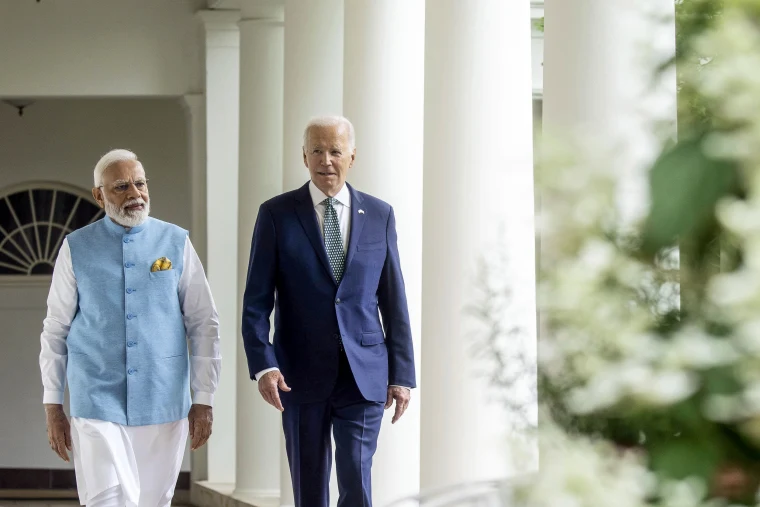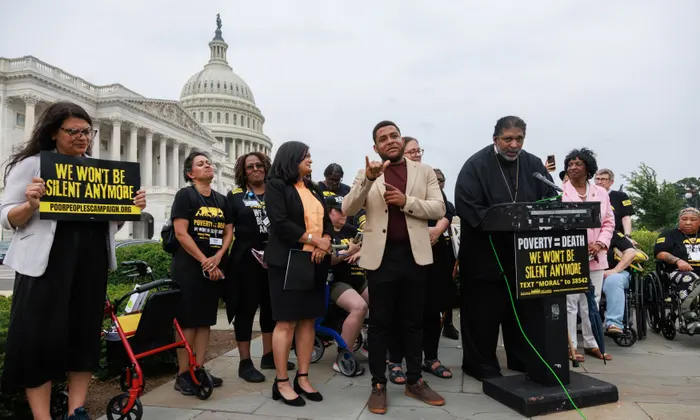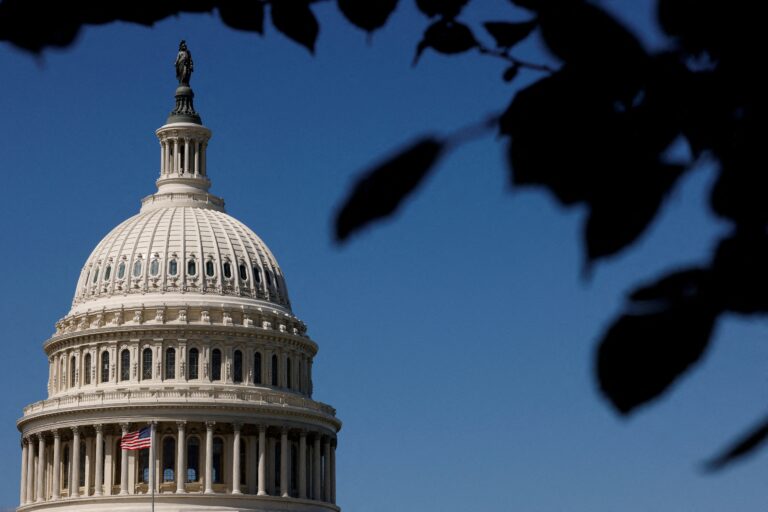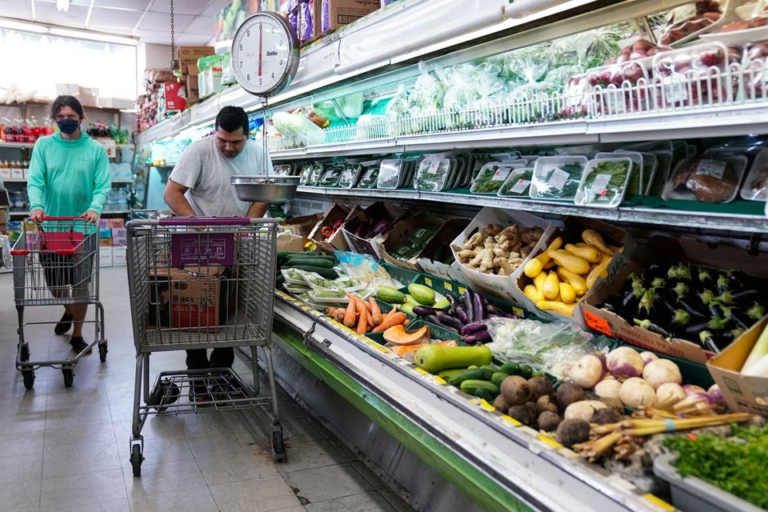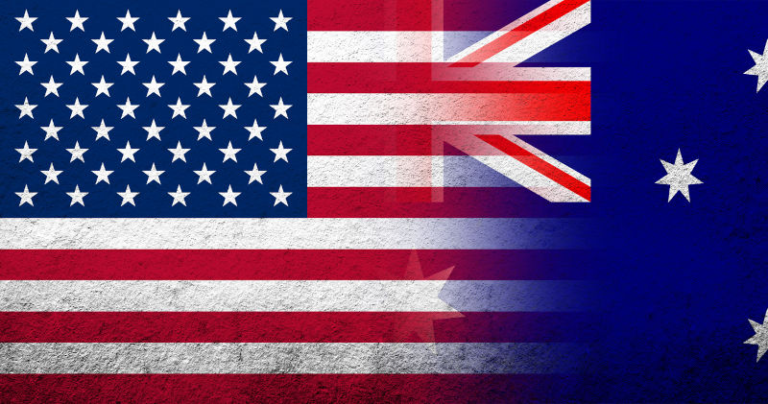WASHINGTON — Indian Prime Minister Narendra Modi received a rousing welcome as he delivered a speech to Congress on Thursday, celebrating the growing ties and shared ambitions of the world’s two largest democracies.
Modi made the rare address to a joint meeting of Congress on the same day President Joe Biden and first lady Jill Biden will host him for a state dinner, an honor reserved for the closest allies of the U.S.
“Now, when our era is at a crossroads, I am here to speak about our calling for this century,” Modi told lawmakers, drawing applause in the House chamber. “I can relate to the battles of passion, persuasion and policy. I can understand the debate of ideas and ideology. But I am delighted to see you come together today to celebrate the bond between world’s two great democracies: India and the United States.
“I agree with President Biden that this is a defining partnership of this century,” he said. “Because it serves a larger purpose. Democracy, demography and destiny give us that purpose.”
While Modi has faced criticism from some U.S. lawmakers and advocates over human rights and his country’s reluctance to break with Russia in its war in Ukraine, the Biden administration and leaders of both major parties are unified in their belief that India is a vital ally for Washington’s top foreign policy goal — containing the rise of China — and a partner on defense, technology and energy.
Modi — who has dealt with violent clashes with China on the border it shares with India — visited at a time of rising U.S.-China tensions.
“The dark clouds of coercion and confrontation are casting their shadow in the Indo-Pacific,” he told Congress. “The stability of the region has become one of the central concerns of our partnership. We share a vision of a free, open and inclusive Indo-Pacific.
“Now, the United States has become one of our most important defense partners,” he said to a standing ovation from lawmakers.
Modi alluded to the “millions” of Americans of Indian origin, including Vice President Kamala Harris, who sat on the dais with him alongside House Speaker Kevin McCarthy, R-Calif. Others in attendance were Indian American members of Congress such as the Progressive Caucus chair, Rep. Pramila Jayapal, D-Wash.; Rep. Ro Khanna, D-Calif., a Biden surrogate; and Rep. Raja Krishnamoorthi, D-Ill., the ranking member of the House’s select committee on China.
A letter led by Sen. Chris Van Hollen, D-Md., and Jayapal, signed by more than 70 Democrats, pressed for Biden to “raise directly with Prime Minister Modi areas of concern” regarding India.
“A series of independent, credible reports reflect troubling signs in India toward the shrinking of political space, the rise of religious intolerance, the targeting of civil society organizations and journalists, and growing restrictions on press freedoms and internet access,” the lawmakers wrote, adding that they seek a discussion about a “full range of issues important to a successful, strong, and long-term relationship between our two great countries.”
Some progressives announced they would boycott the speech, including Rep. Alexandria Ocasio-Cortez, D-N.Y. — who said her move was a stance for “pluralism, tolerance and freedom of the press” — as well as Reps. Ilhan Omar, D-Minn., Rashida Tlaib, D-Mich., Cori Bush, D-Mo., and Jamaal Bowman, D-N.Y.
Modi brushed aside criticisms about his record on human rights, treatment of minorities and free speech when he took rare questions from the media at a joint news conference with Biden at the White House.
“India and America — both countries — democracy is in our DNA. The democracy is our spirit. Democracy runs in our veins. We live democracy,” Modi told reporters. “In India’s democratic values, there is absolutely no discrimination, neither on basis of caste, creed or age or any kind of geographic location.”
Before the speech, Sens. Mark Warner, D-Va., and John Cornyn, R-Texas, the co-chairs of the Senate India Caucus, introduced a bill to add India to the list of favored nations for U.S. arm sales under the Arms Export Control Act, alongside NATO members and Australia, Japan, Israel, New Zealand and South Korea.
Part of their goal is to cultivate closer U.S.-India ties that would help New Delhi break its dependence on Moscow for military equipment. The senators hope to add it to the annual defense authorization bill.
“We need to continue to encourage India to align itself with the democracies in the world and not the autocracies,” Cornyn said. “And obviously, history is a big influence here, because since — what, 1947? — the United States has been more aligned with Pakistan, and India was then forced in the arms of Russia. And obviously, they’re very dependent, still, on Russian weapons.”
Senate Finance Committee Chair Ron Wyden, D-Ore., and ranking member Mike Crapo, R-Idaho, called on Biden to “prioritize the elimination of India’s significant barriers to U.S. trade and investment on the Indian subcontinent.”
Meanwhile, Muslim American activists have organized protests near the White House. Safa Ahmed of the Indian American Muslim Council accused Modi of promoting a “Hindu nationalist ideology” and “anti-minority policies” and criticized Biden’s “decision to platform Modi.”
The invitation for Modi to speak on Capitol Hill was signed by the top Democrat and the top Republican in both the House and the Senate, who mounted a show of bipartisanship to praise “the enduring friendship between the United States and India.”
“Today,” Modi told Congress on Thursday, “we stand at a new dawn in our relationship that will not only shape the destiny of our two nations, but also that of the world.”
Source : NBCNews

